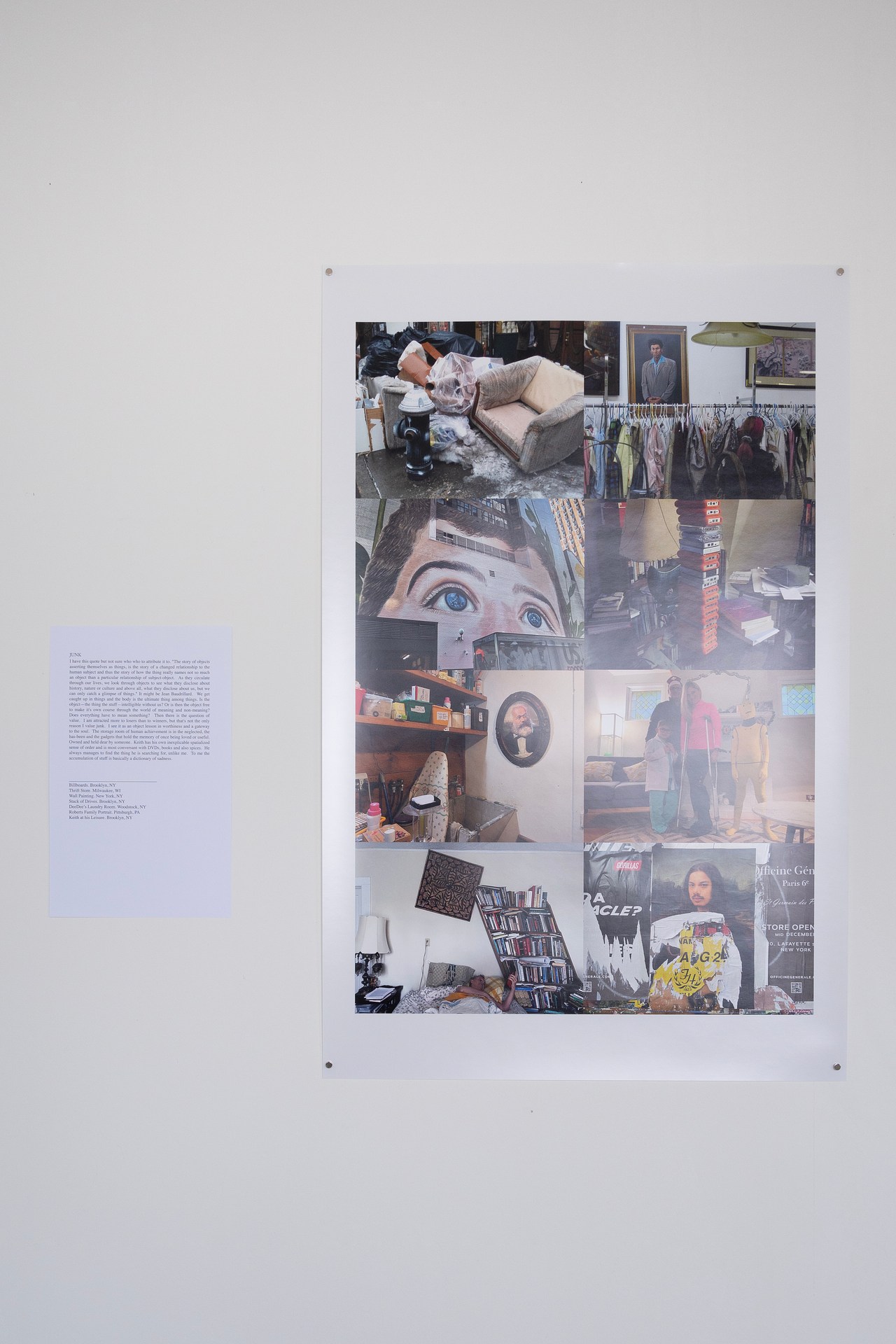Paint, Unpaint
2014 - Film & Video (Film & Video)
1:34 minutes
Kota Ezawa
Paint and Unpaint is an animation by Kota Ezawa based on a scene from a popular 1951 film by Hans Namuth featuring Jackson Pollock. At first glance, due to the oversimplified silhouettes Ezawa employs, the connection between his animation and Namuth’s film may not be obvious. However, when seen side by side, Ezawa’s piece is a faithful reproduction of the scene—up until a point in which his sequence begins playing in reverse, effectively unpainting every brushstroke. The scene in Namuth’s film is remembered by many for its experimental nature: with the camera pointed towards the sky, Pollock paints onto a sheet of glass as Namuth films the process from the opposite side. Through this unique viewpoint, what results is a filmic device that effectively conveyed Pollock’s process of “action painting” to wide audiences. As Ezawa gives this iconic scene a new life as a digital animation, he adds an additional layer of separation from the original source of focus, which is Pollock’s paint. Ezawa’s choice to reference Namuth relates to his ongoing investigation of the symbolic power of images in the mainstream. Allegedly, Namuth was more interested in the image of Pollock than his actual work, and as the author of several photographs and the 1951 film, his own role as image-maker was essential in conveying Pollock’s process to audiences and contributing to his fame. As much as the original film is about Pollock, Ezawa’s retake is constructed around Namuth’s representation of the iconic artist, and the degree to which it was responsible for constructing his identity in our social imaginary.
Kota Ezawa borrows images from the news, art history, and pop culture and turns them into cartoon-like stories. He produces flat and two-dimensional imagery via his light-boxes, works on paper, and animations. These works are often inspired by important moments in history, such as the assassinations of John F. Kennedy and Abraham Lincoln, the O.J. Simpson trial, and media coverage of former National Football League (NFL) player Colin Kaepernick kneeling during the national anthem as a symbol of protest. Ezawa’s animations, which he describes as “moving paintings,” make use of a labor-intensive technique that requires the artist to recreate each frame with close attention, producing hundreds of illustrations via digital drawing and animation software. He is best known for a signature style that embraces vibrant colors and simple forms, stripping detail from images to leave only essential attributes and environments. This reductive technique does not diminish the power of the image, as it turns to the familiar historical or cultural context to fill any gaps left by the artist’s erasures. However, the gesture also invites viewers to think about how these erasures might destabilize the reliability of public memories, highlighting the faulty process of collective remembering and what it tends to overlook.
Colors:
Related works of genres: » san francisco art institute alumni
» see more

© » KADIST
Barry McGee
Barry McGee’s Untitled is a collection of roughly fifty, framed photographs, paintings, and text pieces clustered together in corner...

© » KADIST
Ana Teresa Fernández
2011The artist writes about her work Borrando la Frontera, a performance done at Tijuana/San Diego border: “I visually erased the train rails that serve as a divider between the US and Mexico...

© » KADIST
Paul McCarthy
2008Memory Mistake of the Eldridge Cleaver Pants was created for the show Paul McCarthy’s Low Life Slow Life Part 1 , held at California College of the Arts’s Wattis Institute in 2008 and curated by McCarthy himself...
Related works featuring themes of: » Animation, » Appropriation Art, » Art and Technology, » Collage, » German
» see more

© » KADIST
Mark Leckey
2004In Made In Heaven , we are face to face with a sculptural apparition, a divine visitation in the artist’s studio...

© » KADIST
Wong Wai Yin
2021Drawn from the widely circulated images of protests around the world in support of women rights and racial equality, the phrase I can’t believe we are still protesting is both the title of Wong Wai Yin’s photographic series and a reference to similar messages seen on protest signages...
Other related works, blended automatically
» see more

© » KADIST
Kota Ezawa
2017The Crime of Art is an animation by Kota Ezawa that appropriates scenes from various popular Hollywood films featuring the theft of artworks: a Monet painting in The Thomas Crown Affair (1999), a Rembrandt in Entrapment (1999), a Cellini in How to Steal a Million (1966), and an emerald encrusted dagger in Topkapi (1964)...

© » KADIST
Wong Wai Yin
2021Drawn from the widely circulated images of protests around the world in support of women rights and racial equality, the phrase I can’t believe we are still protesting is both the title of Wong Wai Yin’s photographic series and a reference to similar messages seen on protest signages...
Related works sharing similar palette
» see more

© » ART21
Press Release: Art21 to Release Season Finale of “Art in the Twenty-First Century” | Art21 Our Series Art in the Twenty-First Century Extended Play New York Close Up Artist to Artist William Kentridge: Anything Is Possible Specials Art21.live An always-on video channel featuring programming hand selected by Art21 Playlists Curated by Art21 staff, with guest contributions from artists, educators, and more Art21 Library Explore over 700 videos from Art21's television and digital series Latest Video 9:47 Add to watchlist "Now and Forever" Kerry James Marshall Extended Play December 6, 2023 Search Searching Art21… Welcome to your watchlist Look for the plus icon next to videos throughout the site to add them here...

© » KADIST
Frida Orupabo
2018The archival images used by Frida Orupabo in her collages trace stereotyped representations of race, gender, sexuality and violence...
Related works from the » 2010's created around » San Francisco, California
» see more

© » KADIST
Will Rogan
2010MUM , the acronym used to title a series of Rogan’s small interventions on found magazines, stands for “Magic Unity Might,” the name of a vintage trade magic publication...

© » KADIST
Phillip Maisel
2015While his works can function as abstract, they are very much rooted in physicality and the possibilities that are inherent in the materials themselves...

© » KADIST
Will Rogan
2014Will Rogan’s video Eraser (2014) shows a hearse parked in a clearing amidst leaf barren trees...

© » KADIST
Rodney McMillian
2013In his evocative Landscape Paintings, McMillian uses second-hand bedsheets, sourced from thrift shops, as his starting point...
Other works by: » Kota Ezawa
» see more

© » KADIST
Kota Ezawa
2017The Crime of Art is an animation by Kota Ezawa that appropriates scenes from various popular Hollywood films featuring the theft of artworks: a Monet painting in The Thomas Crown Affair (1999), a Rembrandt in Entrapment (1999), a Cellini in How to Steal a Million (1966), and an emerald encrusted dagger in Topkapi (1964)...

© » KADIST
Kota Ezawa
2002The Simpson Verdict is a three-minute animation by Kota Ezawa that portrays the reading of the verdict during the OJ Simpson trial, known as the “most publicized” criminal trial in history...
Related artist(s) to: Kota Ezawa » Leslie Shows, » Trevor Paglen, » Amy Franceschini, » Andrea Higgins, » Chris Johanson, » Colter Jacobsen, » Desirée Holman, » John Bankston, » Jordan Kantor, » Josephine Taylor
» see more

© » KADIST
Leslie Shows
Human Quarry is a large work on paper by Leslie Shows made of a combination of acrylic paint and collage...

© » KADIST
Jordan Kantor
2009Eclipse is a series of screenprints from Jordan Kantor’s larger vitrine installation that included reworkings of a single image of a small group viewing an eclipse through shielding cut-outs...

© » KADIST
Chris Johanson
2000Apartment on Cardboard (2000) is an exterior view of an abstracted apartment building...

© » KADIST
Desiree Holman
2010Reborn, 2010 is a three-channel video by Desiree Holman that questions ideas of motherhood and the maternal instinct...
Related works found in the same semantic group
» see more

© » KADIST
Artist, filmmaker, and writer John Menick will screen his short video “The Secret Life of Things” (2006), a work in which an unidentified man describes his fixation with “last person on earth” films — films in which a single person awakens to find that he or she is the sole living inhabitant of a city...








